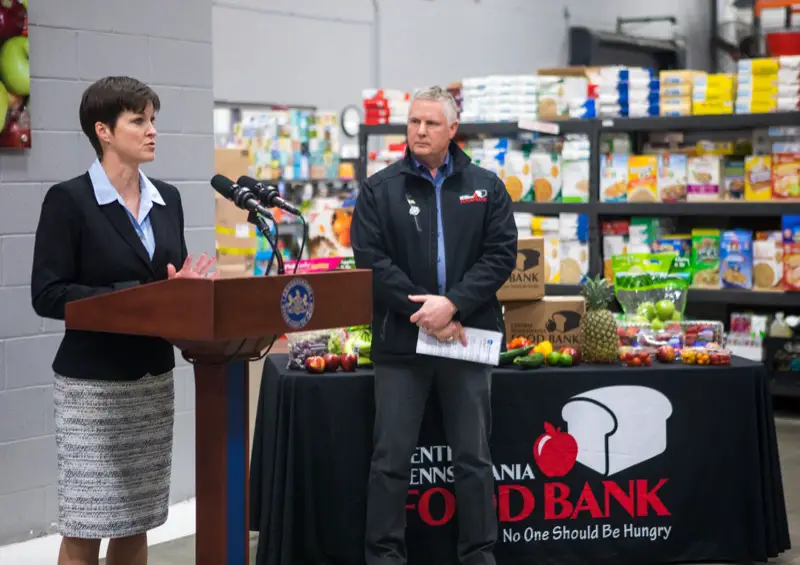 HARRISBURG, Pa. – On Thursday, Department of Human Services (DHS) Secretary Teresa Miller joined Department of Aging (PDA) Secretary Teresa Osborne, stakeholders, and seniors at the Central PA Food Bank to discuss the importance of senior participation in the federal Supplemental Nutrition Assistance Program (SNAP) and Governor Tom Wolf’s Food Security Partnership.
HARRISBURG, Pa. – On Thursday, Department of Human Services (DHS) Secretary Teresa Miller joined Department of Aging (PDA) Secretary Teresa Osborne, stakeholders, and seniors at the Central PA Food Bank to discuss the importance of senior participation in the federal Supplemental Nutrition Assistance Program (SNAP) and Governor Tom Wolf’s Food Security Partnership.
In September 2016, Setting the Table: Blueprint for a Hunger-Free PA was developed to address hunger in PA and respond to Governor Wolf’s executive order establishing the Governor’s Food Security Partnership. The Partnership includes the departments of Aging, Agriculture, Community and Economic Development, Education, Health, and Human Services.
Research has shown that when seniors participate in programs such as SNAP that address food insecurity they become more independent because of improved nutrition status and overall health.
The National Foundation to End Senior Hunger reports seniors who are food insecure have diets that are less nutritious, endure worse health outcomes, and experience a higher risk for depression. Also, a four-year study by Benefits Data Trust compared residents age 65 and older who received SNAP with those who did not. The study found that SNAP beneficiaries had the following:
- 13 percent fewer hospitalizations
- 10 percent fewer emergency room visits
- $2,120 less per year in medical costs
- 23 percent reduction in nursing facility use
- Shorter length-of-stay when in a hospital or nursing facility.
“At DHS we are focused on the social determinants of health – those social and environmental factors that impact an individual’s well-being,” said Miller. “These factors include things like employment, housing, transportation, and what we’re here to talk about today – food security. Hunger has major impacts on health and development, which in turn affect our state budget and health care spending.”
“The Wolf Administration is committed to improving the health and well-being of all Pennsylvanians,” said Secretary Osborne. “While eating well is important at any age, chronic health issues and physical limitations make it difficult for many older adults to get the nutrients they need for a balanced diet. SNAP is a critical piece of the hunger safety net that can help our
seniors alleviate poverty and food insecurity while improving diet, physical and mental health, and overall quality of life.”“We are proud that our Food Bank is a key partner in the Governor’s Food Security Partnership, working together to ensure that more than 400,000 Central Pennsylvanians facing hunger have access to the nutritious food they need every day to be active and healthy,” said Joe Arthur Executive Director of Central Pennsylvania Food Bank “Many of our clients are the most vulnerable of our neighbors – seniors, children, people with disabilities and their caregivers, struggling veterans – which is why our programs like ElderShare, Youth Programs, Military Share and Fresh Express are so important. Our mission success proves that public private partnerships work.”
In Pennsylvania, we estimate that 1.58 million Pennsylvanians live in poverty, and 173,000 of those are seniors. Unfortunately, only approximately 30 percent of eligible seniors currently receive SNAP benefits. The Department of Human Services has made it easier for eligible seniors to sign up for SNAP by reducing the application from 24 pages to two, and has cut red tape by increasing eligibility redeterminations from one to three years.
Food insecurity can also have a profound effect on children. Low-income children are more likely to be food insecure, and food insecurity in households with children is associated with inadequate intake of several important nutrients, deficits in cognitive development, behavioral problems, and poor health.
Since the release of the Blueprint for a Hunger-Free PA, the Wolf administration has completed key steps in eliminating food insecurity by:
- Allowing eligible individuals easier access to benefits through the Elderly/Disabled Simplified Application Project category to ease their renewal process;
- Establishing school breakfast program mini-grants for school districts to implement alternative breakfast models;
- Increasing access to SNAP for community college students;
- Providing access to five employment and training programs for SNAP participants;
- Developing the myCOMPASS PA mobile app allowing individuals access to their
benefits anytime and anywhere;
- Increasing knowledge of summer feeding programs by mailing summer feeding
postcards to all SNAP recipient households with children;
- Expanding access to healthy foods with 160 Healthy Corner Stores throughout the state;
- Distributing more than five million pounds of food to more than 850,000 low-income
households through the Pennsylvania Agricultural Surplus System;
- Growing food security programs in the Medicaid system; and
- Educating individuals and families on necessary nutrition for a healthy life.
“Food insecurity is an issue that has overwhelming impacts on so many parts of our society,” said Miller. “The social determinants of health are too powerful for us to ignore. The work that has been done to move forward with the steps in the blueprint is a testament to a government that works with our stakeholders to provide our constituents the necessary resources to live a healthy and happy life. Everyone should be proud of the work that has been accomplished to date, while realizing there is still work to be done to ensure no Pennsylvanian lives with food insecurities.”
For more information on SNAP and to enroll visit, COMPASS.
For more information regarding the Blueprint for a Hunger-Free Pennsylvania visit, dhs.pa.gov/ending-hunger.
Copyright © 2024 EYT Media Group, Inc. All rights reserved. Any copying, redistribution or retransmission of the contents of this service without the express written consent of EYT Media Group, Inc. is expressly prohibited.








